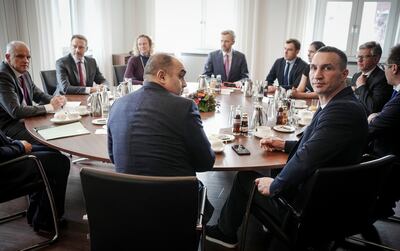Ukrainian former world heavyweight boxing champion Wladimir Klitschko has urged Germany to ramp up its support for Kyiv to help remove Russian invaders.
He said German assistance would be vital to ending the war, as the continent’s largest economy is the “core of Europe”.
Wladimir, 46, whose brother Vitali Klitschko — another former world heavyweight boxing champion — is Kyiv’s mayor, travelled to Berlin on Thursday to put pressure on politicians to pledge further supplies for Ukraine’s military.
His visit came after a report in Germany newspaper Die Welt suggested German Defence Minister Christine Lambrecht had been confused about what weapons Kyiv needed and had failed to send crucial armaments.

Wladimir Klitschko told Germany newspaper Bild the support of Germans was essential to ensuring the war in Ukraine ends.
He said Ukrainians are “stronger in will than arms” and “can’t be stopped unless we all have to be killed”.
“But everything has a limit,” he said. “I want our allies to end this war.”
Addressing politicians in Germany, he said their decisions would help shape “how Ukraine will continue”.
“Germany is the core of Europe. I want Germany to stand for peace — which we are fighting for.”
Germany came in for heavy criticism at the beginning of the Russian invasion of Ukraine over what was perceived as lukewarm support for Kyiv.
Berlin initially resisted pressure to pull back from approving the Nord Stream 2 gas pipeline from Russia and provide weapons to Kyiv.
While Germany did subsequently increase assistance, Ukraine has shown signs it still remains unhappy about its level of support.
During his visit to Berlin, Mr Klitschko held talks with Economic Affairs Minister and Vice Chancellor Robert Habeck and Austrian Chancellor Karl Nehammer.
On Friday, he met with German Finance Minister Christian Lindner for further discussions.
Meanwhile, Ms Lambrecht was accused of being out of touch about the needs of fighters on the ground when signing off on arms shipments.
“It is to be feared that weapons that we particularly need in this phase of the war are not on the list,” German newspaper Welt quoted a Ukrainian government official as saying.
During a visit to New York on Thursday Ms Lambrecht said Germany had delivered more than €80 million ($89m) worth of lethal aid to Ukraine so far.
She told reporters “more are to follow” as she responded to criticism that Berlin was not delivering enough military aid to Kyiv.
Due to the altering nature of Russian attacks, Ukraine’s needs have changed since the invasion began on February 24.
Russian President Vladimir Putin’s forces began their mission using tanks and other armoured vehicles. In the face of apparently heavy losses, artillery shells and rockets are now more prominent.
Germany had promised anti-tank weapons to Ukraine but these are now less relevant, and Kyiv has drawn up a new list of requested weapons.
Reconnaissance and combat drones top the list, followed by artillery reconnaissance radars and fighter jets.
Earlier this month the US dismissed plans by its fellow Nato member Poland to send fighter jets to Ukraine.










































